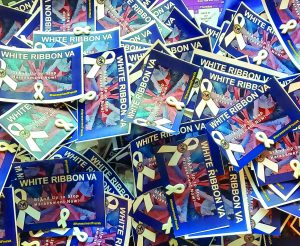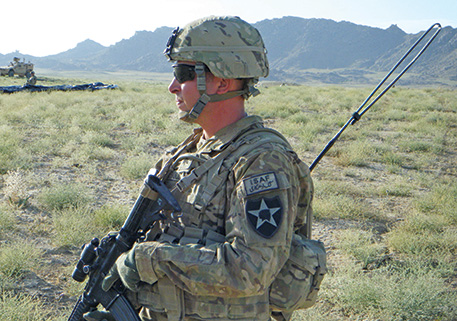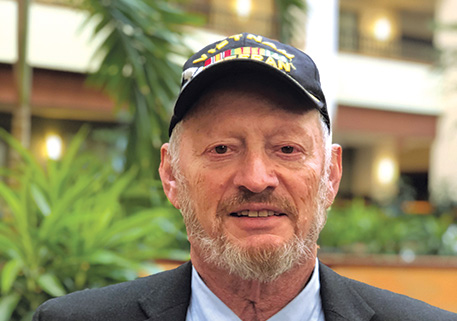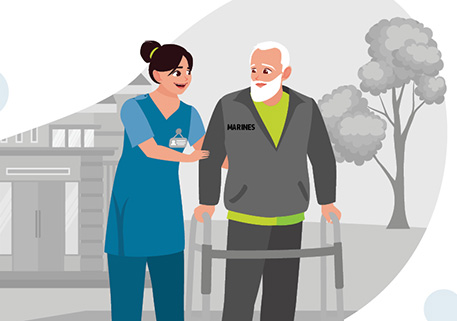 White Ribbon VA aims to end sexual harassment, sexual assault and domestic violence
White Ribbon VA aims to end sexual harassment, sexual assault and domestic violence
Army combat veteran and DAV member Rasyha Clark has made it her life’s mission to help others in need. She’s a licensed mental health counselor who specializes in working with women veterans, and she understands the unique challenges they can face accessing health care at the Department of Veterans Affairs medical facilities.
“When we’re just walking up and down the hallways, it’s fairly male-dominated, as most of the patients that are receiving care typically are older men,” said Clark. “You get these old-fashioned catcalls or, you know, ‘Hey little woman, what are you doing in here?’ Things of that nature.”
While it may seem innocuous to some, this is the type of behavior the VA is trying to stomp out with the launch of White Ribbon VA, a national call to action to prevent and eliminate sexual harassment, sexual assault and domestic violence among all veterans.
According to Lelia Jackson, a 20-year Marine veteran and senior strategist in the Veterans Health Administration Office of the Chief of Staff, one of the most important aspects of the White Ribbon VA campaign is that it enables everyone to be part of the solution.
“Historically, [White Ribbon] has focused on efforts related to men and boys not committing violence against women and girls, but White Ribbon VA, we’ve really focused on a genderless movement,” said Jackson. “Men, women, veterans, employees and our larger community can participate.”
The campaign focuses on educating veterans, family members, staff and partners about respectful interactions and recognizing that unwanted touching, hugging, flirting, catcalling or commenting about someone’s appearance may make others feel uncomfortable or unwelcome. It’s also about speaking up.
“Sometimes you don’t want to say anything because you don’t know quite what to say,” said Jackson. “In those instances, just tell the police, tell the patient advocate or a doctor, tell someone. And that’s a part of our pledge, to never commit, excuse or remain silent about sexual harassment, domestic violence and sexual assault.”
In September, the Veterans Health Administration (VHA) introduced a virtual bystander intervention training tool in all its facilities—an approach to teach staff and providers how to intervene when witnessing inappropriate behaviors.
A peer-reviewed, VA-funded study published in Women’s Health Issues, the official journal of the Jacobs Institute of Women’s Health at George Washington University, evaluated the implementation of that training among 180 VHA staff members, made up of medical professionals, mental health care staff and other employees. It showed a significant and positive result.
“At pretest, most staff reported witnessing harassment, yet fewer than one-half had intervened,” the study’s authors noted. “By post-test, staff reported significantly decreased barriers to intervening and increased awareness, self-efficacy, and intentions to intervene. Belief that harassment is a problem increased from 42.4% to 75.0%.”
VA studies show 1 in 4 women veterans reported experiencing harassment within VA facilities, and as part of the VA’s national End Harassment Workgroup, women veterans also reported experiencing gender harassment. This often presents as male counterparts questioning a veteran’s status by making statements that imply women did not serve in the military or that they do not belong at the VA.
“It starts when we pull up to the parking lot and we attempt to park in a Purple Heart spot, and we have a Purple Heart—even if our license plate doesn’t say it—and someone tells us, ‘You’re a woman. That can’t be you; that’s not your experience,” said Clark.
“These kinds of interactions can lead to decreased access and engagement with VA health care,” said National Legislative Director Joy Ilem. “We know that, often, veterans who report experiencing harassment at the VA are more likely to delay or miss their medical appointments all together, which means they are not getting the care they earned.”
Campaigns like White Ribbon VA and the implementation of bystander intervention training are, in Clark’s eyes, a step in the right direction toward improving the VA’s culture.
“I’m so grateful to be able to have comprehensive health care, but there’s room for improvement [at the VA],” said Clark. “And I’m grateful for people’s ability to look at some of these issues and work towards building a better health care system for all of us.”
To learn more about White Ribbon VA, visit va.gov/health/harassment-free.






